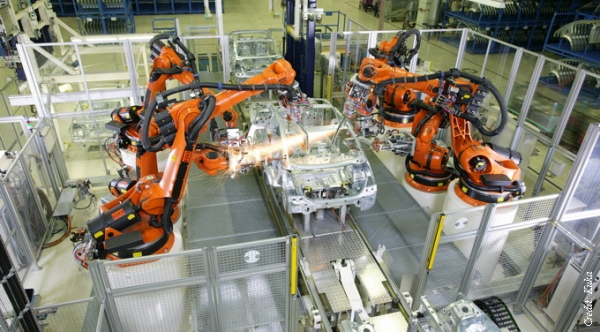China is aiming high on the industrial ladder. Getting there requires advanced equipment such as robots that is still firmly in the hands of foreign enterprises.

Industrial robots are used to do things like bolt panels on cars or assemble motherboards. China is the world’s second-largest robotics market, growing on average by 25% per year between 2005 and 2012, according to the International Federation of Robotics. The country is projected to become the biggest market for industrial robots by 2016.
At the end of December, Kuka, a German firm, opened the doors to a new plant in Shanghai, seeking to capture expanding opportunities. Kuka announced that it had won big orders for robots from the booming domestic auto industry, which produced a record number of cars in 2013.
There are few Chinese companies to compete for that business. Experts say China’s robotics industry has not developed like its other industrial machinery sectors due to a lack of government support, insufficient demand and cultural prejudices.
However, as demand kicks up a gear on the back of further Chinese industrialization and as more small and medium firms decide to automate processes to reduce production costs, local companies may start to assemble.
The likes of Kuka, ABB of Switzerland, and Fanuc and Yaskawa Electric of Japan have flocked to China, attracted by an explosion in auto production. More than 15 million passenger cars were produced in 2013, a record for China. New car plants are opening all the time; Volkswagen and General Motors are investing a combined US$36 billion in the country to raise capacity.
Robots are now also increasingly being sought in traditional sectors such as apparel.
The growth in the army of robots tracks rising wages. A shortage of workers in eastern China has squeezed margins and led to a double-digit jump in the cost of labor at factories. This is making automation all the more attractive. In 2011, Terry Gou, the boss of Foxconn, a Taiwanese electronics firm that makes phones and tablets for Apple, proclaimed that he wanted to introduce one million robots at his firm’s factories in China within three years – the kind that won't protest working conditions or petition for higher wages.
And as more youngsters find work in shops and restaurants, previous cultural objection to robots as takers of once sought-after manufacturing jobs are waning, clearing the path for their adoption.
When the time comes, it is foreign firms that are set to cash in on that windfall in demand, not Chinese ones. “We [China] lack core robotics technology… domestic robotics companies are still not able to make reliable and competitive products as foreign robotics companies,” Yueh-Hsuan Weng, Research Associate at Peking University’s Law School, told China Economic Review.
Going on past precedents, when China starts to need certain equipment for its industrial development, it drafts policies to support domestic firms to invest and build their own capabilities. This has not yet been the case for this industry, noted Yueh-Hsuan.
At the same time, foreign investment in the manufacture of the most commonly used industrial robots has been encouraged by the Ministry of Commerce. Once China feels that it has comfortably mastered a technology it starts to scale back incentives for overseas investors.
Industrial policymakers are slowly catching up. At the end of December, the Ministry of Industry and Information Technology published simple policy guidelines for the robotics industry. This is the first step in encouraging domestic firms to plough cash into robotics. Further details and, crucially, incentives will need to follow at a later date.
The same trends that are attracting foreign investors into China’s robotics market are bound to stimulate the interest of their local counterparts. Still, Kuka has little to worry about in the immediate future, and should have plenty of time to enjoy the benefits of its expansion here.

